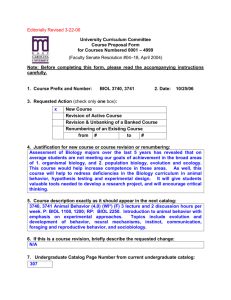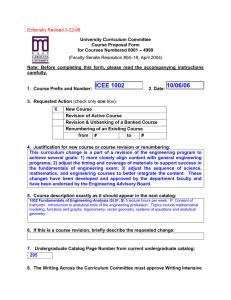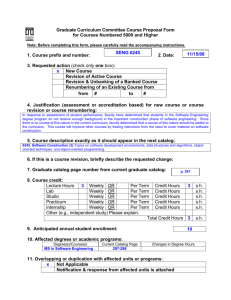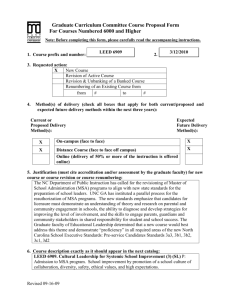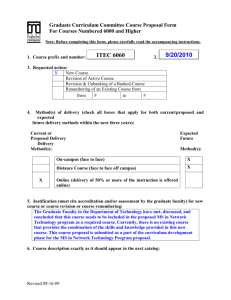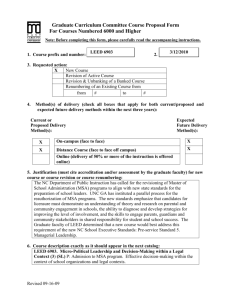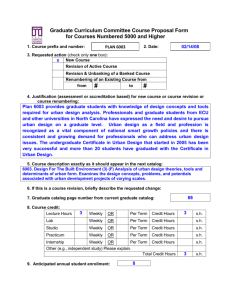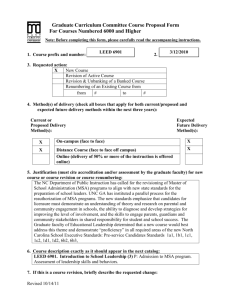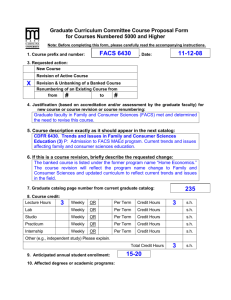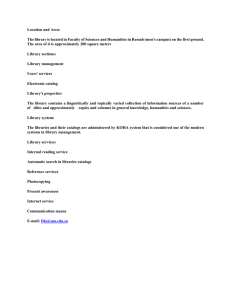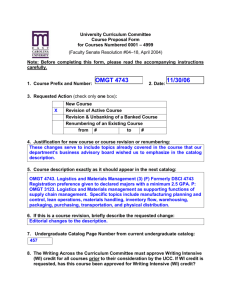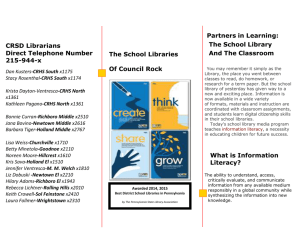LIBS 6810
advertisement
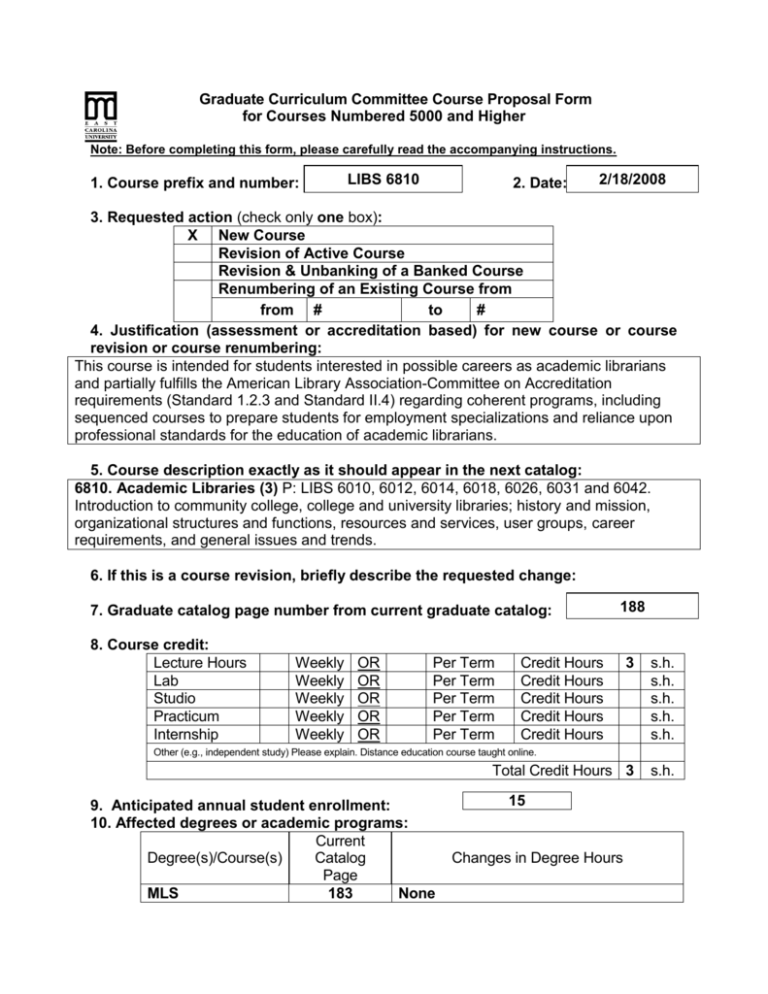
Graduate Curriculum Committee Course Proposal Form for Courses Numbered 5000 and Higher Note: Before completing this form, please carefully read the accompanying instructions. 1. Course prefix and number: LIBS 6810 2. Date: 2/18/2008 3. Requested action (check only one box): X New Course Revision of Active Course Revision & Unbanking of a Banked Course Renumbering of an Existing Course from from # to # 4. Justification (assessment or accreditation based) for new course or course revision or course renumbering: This course is intended for students interested in possible careers as academic librarians and partially fulfills the American Library Association-Committee on Accreditation requirements (Standard 1.2.3 and Standard II.4) regarding coherent programs, including sequenced courses to prepare students for employment specializations and reliance upon professional standards for the education of academic librarians. 5. Course description exactly as it should appear in the next catalog: 6810. Academic Libraries (3) P: LIBS 6010, 6012, 6014, 6018, 6026, 6031 and 6042. Introduction to community college, college and university libraries; history and mission, organizational structures and functions, resources and services, user groups, career requirements, and general issues and trends. 6. If this is a course revision, briefly describe the requested change: 7. Graduate catalog page number from current graduate catalog: 8. Course credit: Lecture Hours Lab Studio Practicum Internship Weekly Weekly Weekly Weekly Weekly OR OR OR OR OR Per Term Per Term Per Term Per Term Per Term 188 Credit Hours Credit Hours Credit Hours Credit Hours Credit Hours 3 s.h. s.h. s.h. s.h. s.h. Total Credit Hours 3 s.h. Other (e.g., independent study) Please explain. Distance education course taught online. 9. Anticipated annual student enrollment: 10. Affected degrees or academic programs: Current Degree(s)/Course(s) Catalog Page MLS 183 None 15 Changes in Degree Hours 11. Overlapping or duplication with affected units or programs: X Not Applicable Notification & response from affected units is attached 12. Approval by the Council for Teacher Education (required for courses affecting teacher education programs): X Not Applicable Applicable and CTE has given their approval. 13. Statements of support: a. Staff X Current staff is adequate Additional Staff is needed (describe needs in the box below): b. Facilities X Current facilities are adequate Additional Facilities are needed (describe needs in the box below): c. Library X Initial library resources are adequate Initial resources are needed (in the box below, give a brief explanation and an estimate for the cost of acquisition of required initial resources): d. Computer resources X Unit computer resources are adequate Additional unit computer resources are needed (in the box below, give a brief explanation and an estimate for the cost of acquisition): ITCS Resources are not needed The following ITCS resources are needed (put a check beside each need): Mainframe computer system Statistical services Network connections Computer lab for students Software Approval from the Director of ITCS attached 14. Course information: see Instructions for Completing the Graduate Curriculum Committee Course Proposal Form for more detail. a. Textbook Budd, J.M. (2005). The changing academic library: Chicago: American Library Association Operations, culture, environments. Simmons-Welburn, J. & McNeil, B. (Eds.). (2004). Human resource management in today’s academic library: Meeting challenges and creating opportunities. Westport, CT: Libraries Unlimited. [electronic book available through Joyner Library online catalog] b. Course Objectives 1. Discuss the history and culture of academe in the United States, and the role of the academic library in academe. 2. Examine, discuss and analyze issues facing academic libraries. 3. Propose, explain and justify multiple solutions to authentic and current challenges in contemporary academic libraries. 4. Demonstrate an understanding of the role of the academic librarian, and the opportunities and limitations of this specialization by appraisal and critique of academic library organizations, explanation of the competencies required for practice, and drawing inferences about the future of the specialization within the profession. 5. Determine a personal level of commitment to participation and service in relevant professional associations by writing a career scholarship and service plan. 6. Write at an expert level on one issue facing academic libraries, and submit course artifact to a professional publication. c. Course Topic Outline 1. Brief introduction to the history and culture of higher education in the United States 2. Systems of scholarly communication 3. An introduction to the case study method and case analysis 4. Control and evaluation systems in academic libraries 5. Information Literacy 6. Finance, budget and facilities in the academic library 7. Organization, services and programs in the academic library 8. Collections and engagement with faculty as co-builders 9. Professional associations for academic librarians and participation in continuing professional development 10. The role of librarianship in higher education d. Assignments, weights and grade scale Assignment Response paper and discussion Evaluation of scholarly communication systems and discussion Q & A session on case study method and case analysis (participation optional; no assignment) Case study in conflicting demands Lesson plan for information literacy class in English 101 Case study in resource planning Case study in organizational change Case study in serials cancellation Personal plan for scholarship and service Position paper and discussion of the roles and status of academic librarians Topic paper submitted for publication Total points available Grading scale: A = 92-100 B = 85-91 C = 75-84 F = 74 or lower Weight 5 5 0 10 10 10 10 10 5 5 30 100
